10 Best Calculus Courses for 2025: Derivatives and Integrals
Need calculus for your degree? Learn introductory, single variable, multivariable, vector, applied calculus and more from MIT, Harvard, and other institutions.

So, the degree in your field of interest requires calculus, a subject whose mere mention strikes terror in the hearts of many. But we are here to help you through with a choice of top-notch calculus courses from leading universities and instructors including MIT, Harvard, the University of Sydney, Delft University of Technology and others.
I explored over 1400 courses in the Class Central Calculus subject, and chose the ten most highly-rated for this Best Courses Guide (BCG).
Click on the shortcuts for specifics:
- Top Picks
- What is Calculus?
- Stats
- More Useful Free Resources
- Why You Should Trust Us
- How We Made Our Picks and Tested Them
Top Picks
Click to jump to course details.
What is Calculus?
According to Wikipedia, calculus is the mathematical study of continuous change. Developed independently by Isaac Newton and Gottfried Wilhelm Leibniz in the 17th century, calculus has two major branches, differential calculus and integral calculus.
- Differential calculus studies instantaneous rates of change, and the slopes of curves
- Integral calculus focuses on accumulation of quantities, and areas under or between curves.
Calculus makes use of the principles of convergence of infinite sequences and infinite series to a defined limit.
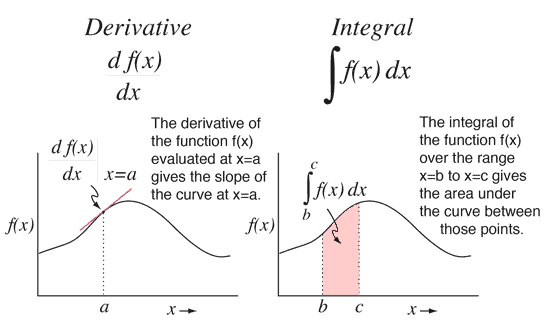
Calculus is used in statistics, science, machine learning, engineering, economics, business, medicine, and demography, wherever a problem can be mathematically modeled to arrive at an optimal solution.
Khan Academy recommends you have a solid foundation in algebra, geometry, and trigonometry before studying calculus.
Stats
- 9 courses are free or free-to-audit and 1 is paid
- 6 courses offer a certificate of completion
- The Calculus subject is followed by 93K learners on Class Central
- The most featured provider is Coursera with 5 courses.
Best Introduction to Calculus (The University of Sydney)
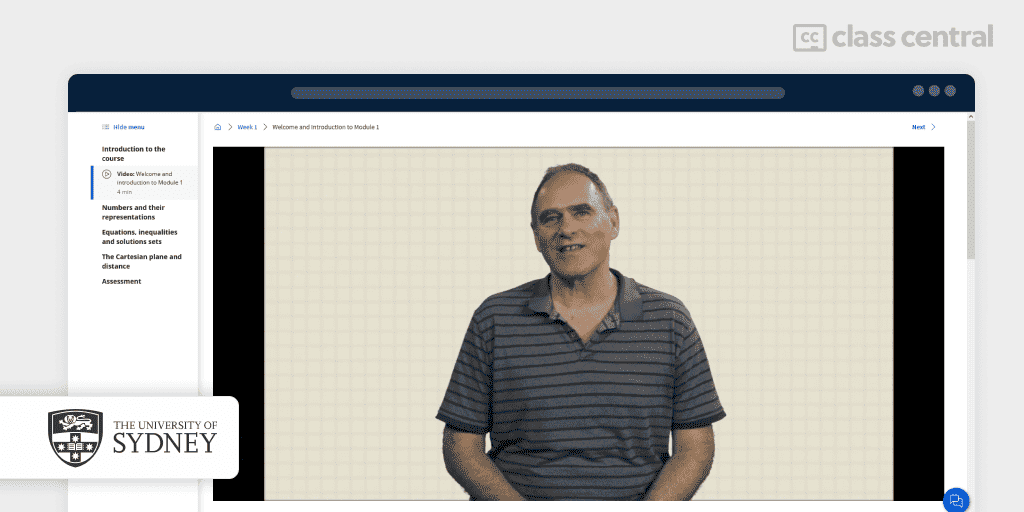
Are you a student interested in pursuing a career in science, engineering, or commerce? Or looking to refresh your calculus knowledge? Introduction to Calculus has no specific prerequisites and is designed to lay a solid foundation in calculus. The course balances theory with practical application, so you’ll not only understand the key concepts and historical background of calculus but also how to apply these concepts in real-world scenarios. It starts with precalculus basics and culminates in a comprehensive exploration of integral calculus.
You will gain:
- A strong understanding of precalculus, including equation manipulation and elementary functions
- Fluency in the preliminary methodology of tangents, limits, and the definition of a derivative
- Mastery in methods of differential calculus with practical applications
- Comprehensive knowledge of integral calculus, including the Fundamental Theorem of Calculus and methods for capturing areas under curves.
“This was a very well taught course by an enthusiastic professor who genuinely cared about his students’ grasp of the material. I found the ‘reading notes’ to be especially useful for review and complete understanding of the concepts…” – Russell L. McCoy, Class Central learner.
| Provider | Coursera |
| University | The University of Sydney |
| Instructor | David Easdown |
| Time Commitment | 59 hours |
| Enrollment | 260K |
| Rating | 4.8/5.0 (3.7K) |
| Cost | Free audit |
| Certificate | Paid |
Also Great Introduction to Calculus (Delft University of Technology)

Winning the 2016 Open Education Award for Excellence, Pre-University Calculus is designed to bridge the gap between high school and university mathematics. Your confidence and proficiency in mathematics will grow before you embark on university-level calculus with this comprehensive approach and the inclusion of inspirational content on the application of mathematics. If youwant to strengthen your mathematical foundation before pursuing a Bachelor in Science, Engineering, or Technology, take this course! It covers essential topics, teaches you skills and demonstrates how these mathematical principles apply in a range of fields.
In this course, you’ll learn:
- Five key mathematical subjects: functions, equations, differentiation, integration, and analytic geometry
- Necessary definitions and mathematical concepts for calculus
- Skills to apply mathematical techniques and solve problems
- Confidence in using basic mathematical techniques for university-level calculus
- Insight into the application of mathematics in various engineering and science disciplines.
This course is part of two Delft University of Technology Professional Certificates:
Science and Engineering Prep: Pre-university Calculus and Physics (75-100 hours)
Science and Engineering – Pre-university Calculus, Physics and Chemistry (100-125 hours)
“…It’s a basic introduction to Calculus, and it’s good as such, as a basic introduction for people who want to know a bit about it, without going deep or digging into complex subjects.” – Cord, Class Central learner.
| Provider | edX |
| University | Delft University of Technology |
| Instructors | Bart van den Dries, Roelof Koekoek, Wolter Groenevelt, Fokko van de Bult, and Iris Smit |
| Time Commitment | 48-64 hours |
| Enrollment | 153K |
| Rating | 4.4/5.0 (21) |
| Cost | Free audit |
| Certificate | Paid |
Best Courses on Single Variable Calculus (University of Pennsylvania)
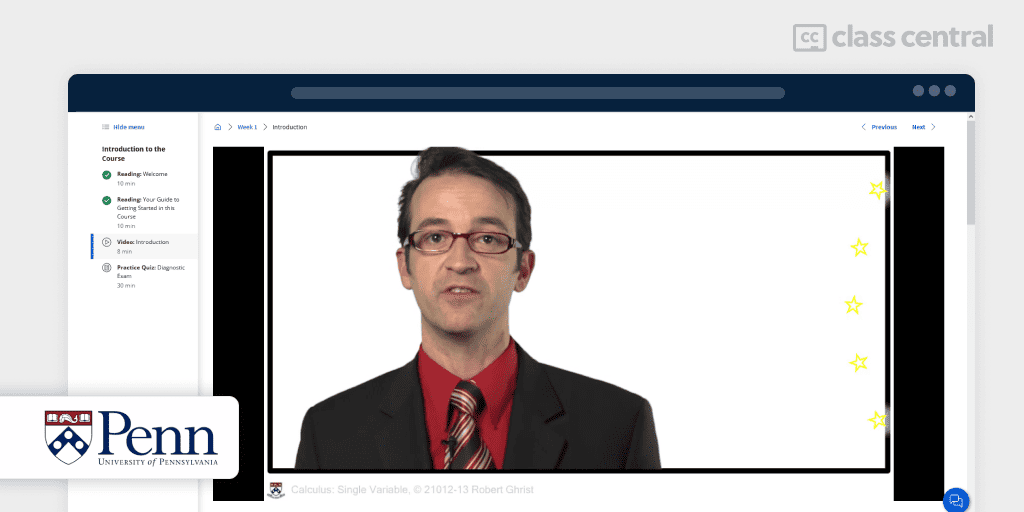
Single variable calculus deals with functions that have only one independent variable. It’s a relatively simpler and more intuitive part of calculus, often visualized as curves and areas in 2D space.
Penn has produced a series of five courses on Single Variable Calculus. Although Calculus: Single Variable Part 1 – Functions does not require a minimum score on its diagnostic exam, welcoming all interested learners, you may discover some prior calculus knowledge is helpful.
This is a comprehensive introduction to single-variable Calculus, focusing on conceptual understanding and applications. It’s designed for students embarking on studies in engineering, physical, and social sciences. The course offers a unique blend of discrete and continuous Calculus forms. It emphasizes conceptual learning over computational drills, providing a dynamic and unified approach to the subject.
What you’ll gain from this course:
- A solid foundation in the core concepts of single-variable Calculus
- An understanding of Taylor series and how to compute them
- Insights into limits and asymptotics, including the application of l’Hopital’s rule
- Proficiency in using BIG O notation for describing the behavior of functions.
You can purchase a certificate after you complete all the courses. The other four courses in the series are:
- Calculus: Single Variable Part 2 – Differentiation (10 hours)
- Calculus: Single Variable Part 3 – Integration (17 hours)
- Calculus: Single Variable Part 4 – Applications (21 hours)
- Single Variable Calculus (14 hours).
“Very Informative course and easy to catch. Although knowledge on the subject is a prerequisite before taking this. Not advisable to those with no knowledge whatsoever in calculus.” – JV, Coursera learner.
| Provider | Coursera |
| Institution | University of Pennsylvania |
| Instructor | Robert Ghrist |
| Time Commitment | 62 hours (4 courses) |
| Enrollment | 145K (First course) |
| Rating | 4.7/5.0 (2.2K) |
| Cost | Free |
| Certificate | Not available |
Best Course on Multivariable Calculus (MIT)
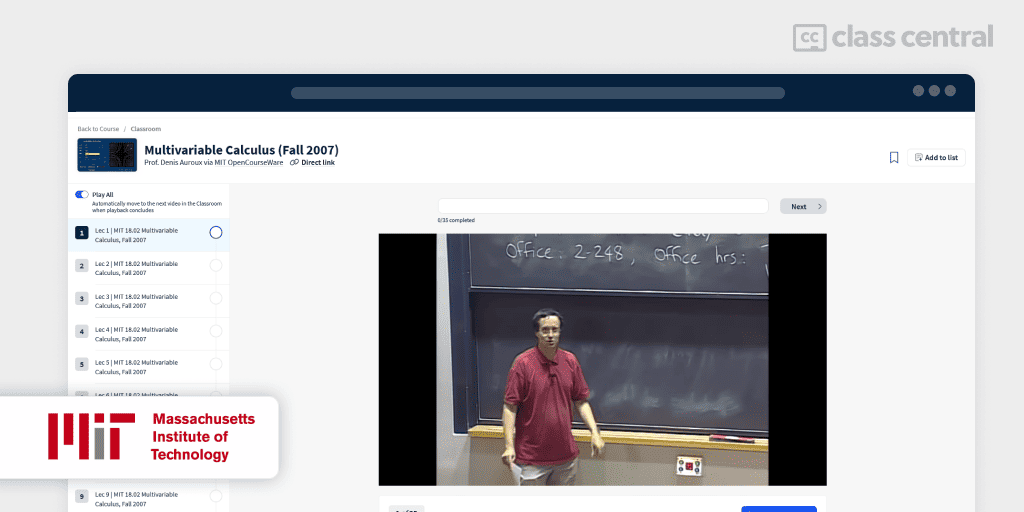
Multiple variable calculus deals with functions that have two or more independent variables. It introduces new tools like partial derivatives to handle multiple variables and directional derivatives to analyze change in specific directions. Often visualized as surfaces, volumes in 3D or higher spaces.
Multivariable Calculus (Fall 2007) is ideal for students and professionals in the fields of science, technology, engineering, and mathematics (STEM). The course covers essential topics in multivariable calculus, starting from the basics and advancing to more complex concepts. It is designed to facilitate a deep understanding of multivariable functions and is perfect if you’re a learner looking to solidify your calculus foundation for applications in higher-level STEM courses and research.
A firm understanding of Single Variable Calculus is required for this course, such as Single Variable Calculus (Fall 2006) (29 hours).
In this course, you’ll gain:
- A solid foundation in multivariable calculus concepts
- Understanding of gradients, divergences, and other advanced calculus topics
- Skills to apply calculus concepts in higher-level STEM courses and research.
“An extraordinary course from an extraordinary lecturer that gives a good intuition about the subject. Made me fall in love with the subject as well as helped me develop a solid foundation for all my future courses.” – Aman Kumar.
| Provider | MIT OpenCourseWare |
| University | Massachusetts Institute of Technology |
| Instructor | Prof. Denis Auroux |
| Time Commitment | 28 hours |
| Rating | 5.0/5.0 (2) |
| Cost | Free |
| Certificate | Not available |
Best Vector Calculus Course for Engineers (The Hong Kong University of Science and Technology)
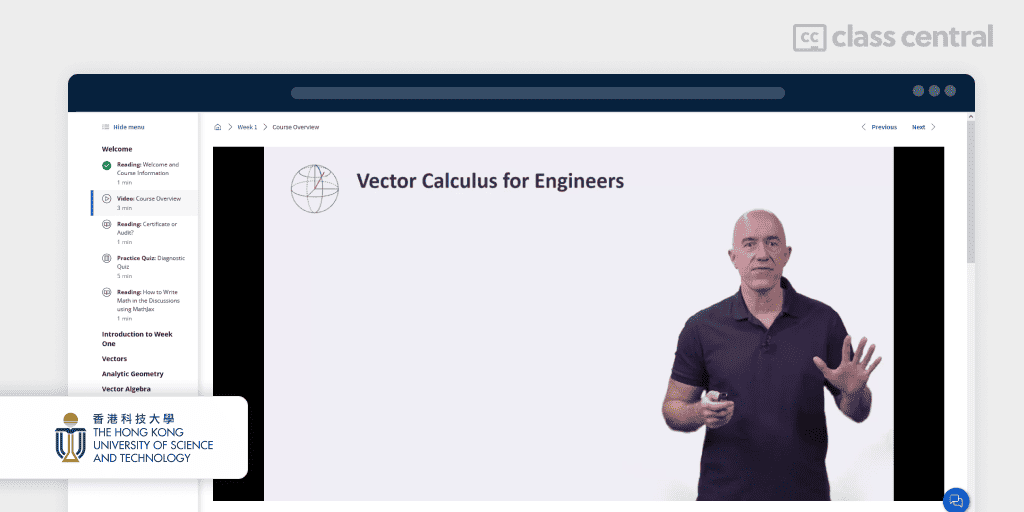
While single and multiple variable calculus deal with functions and their properties, vector calculus focuses on vectors. These are mathematical objects with both magnitude (size) and direction often visualized in 3D.
Vector Calculus for Engineers is meticulously designed to bridge the gap between theoretical foundations and practical applications of Vector Calculus. Ideal for students and professionals with two semesters of single-variable calculus under their belt, it further explores the fundamental theorems of vector calculus crucial for engineering fields such as Electromagnetism and Fluid Mechanics. The course is structured into 53 concise lecture videos complemented by lecture notes, problem-solving exercises, and quizzes to reinforce learning. Vector Calculus for Engineers stands out for its comprehensive coverage and practical approach to complex concepts, making it an essential learning tool for aspiring engineers.
What you will gain from this course:
- A deep understanding of scalar and vector fields, and how to differentiate these fields
- Mastery in multidimensional integration, curvilinear coordinate systems, and their applications
- Proficiency in computing line and surface integrals
- Comprehensive knowledge of the fundamental theorems of vector calculus, including the gradient theorem, the divergence theorem, and Stokes’ theorem, and their applications in engineering
- Practical problem-solving skills through exercises and quizzes, supported by detailed lecture notes.
See our guide for how to audit the course for free. A shorter version of the course is available here: Vector Calculus for Engineers (9 hours) and Jeffrey Chasnov’s Matrix Algebra for Engineers (20 hours) is in Class Central’s Best Online Courses of All Time list.
“Although I earned a BS degree in chemical engineering in 1999 and have taken multivariable calculus, Professor Jeffrey Chasnov’s Vector Calculus for Engineers was a great challenging learning process…” -Chris Harding, Class Central learner.
| Provider | Coursera |
| Institution | The Hong Kong University of Science and Technology |
| Instructor | Jeffrey R. Chasnov |
| Time Commitment | 30 hours |
| Enrollment | 43K |
| Rating | 4.8/5.0 (1.3K) |
| Cost | Free audit |
| Certificate | Paid |
Best Calculus Course for Machine Learning (Imperial College London)
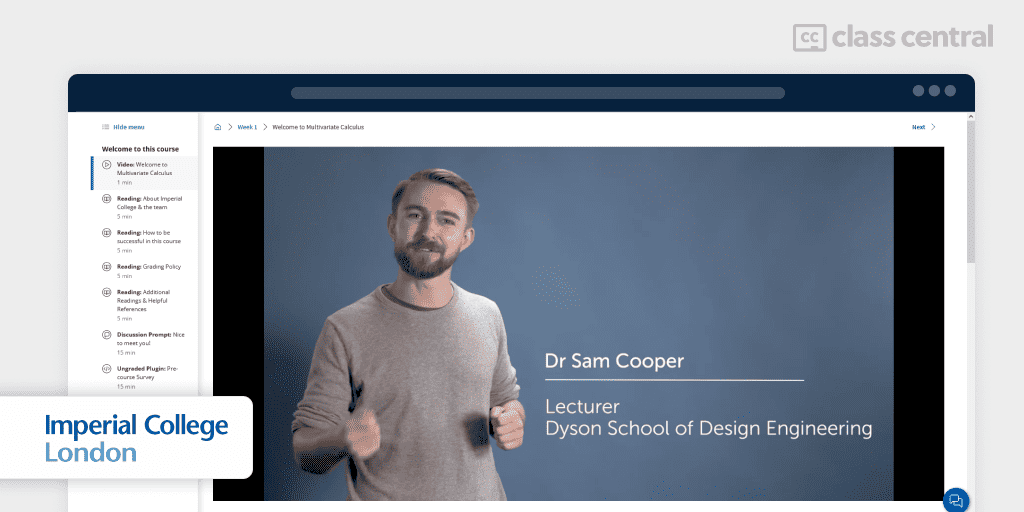
Do you need to learn multivariate calculus to pursue studies in machine learning? Mathematics for Machine Learning: Multivariate Calculus is a comprehensive introduction to multivariate calculus, tailored specifically for those interested in machine learning. Starting with the basics of calculus, it quickly moves on to more complex concepts. Through interactive games and Python coding exercises, you’ll grasp theoretical knowledge and practical skills. The experienced instructors ensure that even complex topics are explained in an accessible manner.
Not for the faint-hearted, but the reviews agree it’s an excellent course.
What learners will gain from this course:
- A solid foundation in both basic and multivariate calculus
- Practical skills in applying calculus to solve machine learning problems, including neural networks and linear regression models
- An intuitive understanding of calculus concepts, enabling further self-study in advanced machine learning topics
- Experience in using Python for mathematical modeling and optimization in machine learning contexts.
See our guide for how to audit the course for free. This course is part of the Mathematics for Machine Learning Specialization.
“This is the best course I have done so far, the practical part of the course is wonderful, you get to program a neural network just using numpy as a help, learn to differentiate, jacobians, hessians, newton ramphson, it is a very difficult course but it compensates when you can finish it. ” – Giuliano Lemes, Class Central learner.
| Provider | Coursera |
| Institution | Imperial College London |
| Instructors | Samuel J. Cooper, David Dye and A. Freddie Page |
| Time Commitment | 18 hours |
| Enrollment | 146K |
| Rating | 4.7/5.0 (5.6K) |
| Cost | Free audit |
| Certificate | Paid |
Best Courses for Data and Modelling (Johns Hopkins University)
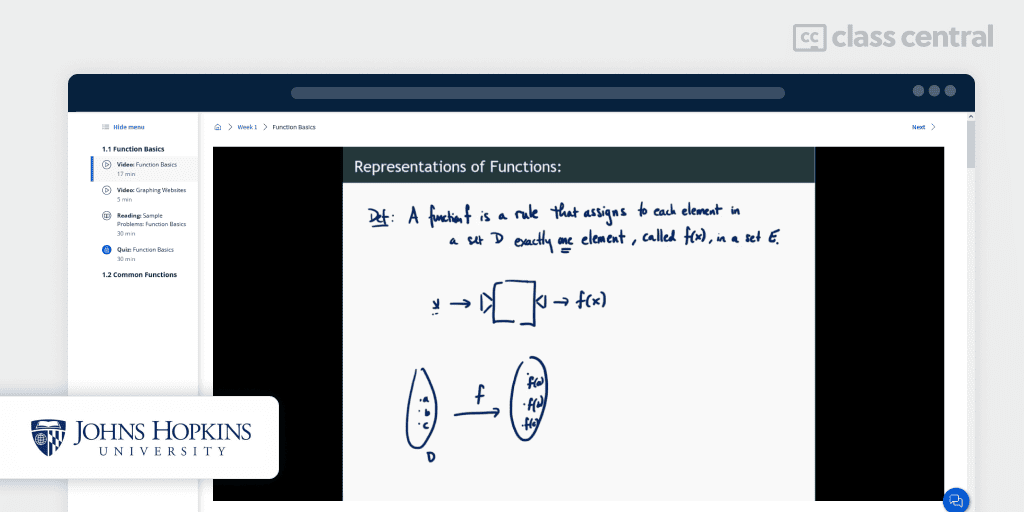
Are you a student of natural science, computer science, psychology, or sociology? Precalculus: Relations and Functions is a comprehensive course designed to equip students across various disciplines with the foundational mathematical tools necessary for modeling, understanding, and interpreting the world. With no prerequisites, this course is perfect if you’re seeking to apply mathematical concepts to your field. It offers a unique blend of theory and practical applications, preparing you for advanced studies in science and calculus. You’ll explore functions, their properties, and applications in data analysis, with a focus on real-life data and exercise sets to reinforce learning.
You will:
- Gain a solid understanding of functions and their significance in analyzing relationships between variables
- Master identifying and applying algebraic operations on functions
- Learn skills to model real-world situations using linear and quadratic functions
- Know exponential and logarithmic functions and their applications in natural phenomena
- Explore and utilize properties of logarithms in real-world examples.
Precalculus: Relations and Functions paves the way for two Calculus Specializations from Johns Hopkins University:
Differential Calculus through Data and Modeling (30-34 hours)
Integral Calculus through Data and Modeling (21-25 hours).
See our guide for how to audit the courses for free.
“One of the best online courses I took! I love it! The course is friendly for beginners and those who have graduated from schools for years. The teacher is particularly patient and thoughtful…” – Jeremy ’ K, Coursera learner.
| Provider | Coursera |
| Institution | Johns Hopkins University |
| Instructor | Joseph W. Cutrone, PhD |
| Time Commitment | 12 hours |
| Enrollment | 17K |
| Rating | 4.7/5.0 (211) |
| Cost | Free audit |
| Certificate | Paid |
Best Course on Integrals (blackpenredpen)
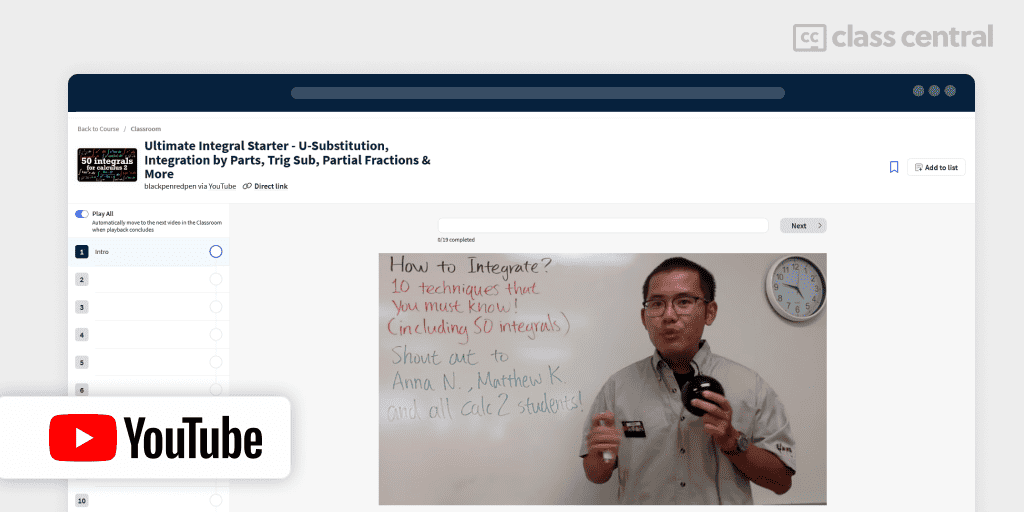
Do you want a comprehensive journey through essential integral techniques required in Calculus 2? Ultimate Integral Starter is structured to ensure a deep understanding of each technique, demonstrated through 50 integral examples such as the integral of x/(1+x^4) and the integral of sin^2(x), among others. The instructor brings his experience and knowledge directly to learners through detailed video explanations. This course does not require any prerequisites beyond a basic understanding of calculus, making it accessible to those interested in enhancing their integral calculus skills.
In this course you’ll gain:
- Mastery over various integral techniques including u-substitution, trigonometric substitution, and integration by parts
- The ability to decompose complex integrals using partial fraction decomposition
- Skills to solve non-elementary integrals and apply trig identities effectively
- Confidence in tackling a wide range of integral problems through practical examples.
Find more calculus courses from blackpenredpen on YouTube.
“Professor Chow has done a great job organizing this stuff. Due to his excellent lectures and the miracle of pause, rewind and review on YouTube, you can learn more in one week than you can learn in a year in a traditional classroom.” – postholedigger8726, YouTube learner.
| Provider | YouTube |
| Channel | blackpenredpen |
| Time Commitment | 6 hours |
| Views | 1.1M |
| Likes | 41K |
| Cost | Free |
| Certificate | Not available |
Best Applied Calculus Course (Harvard University)
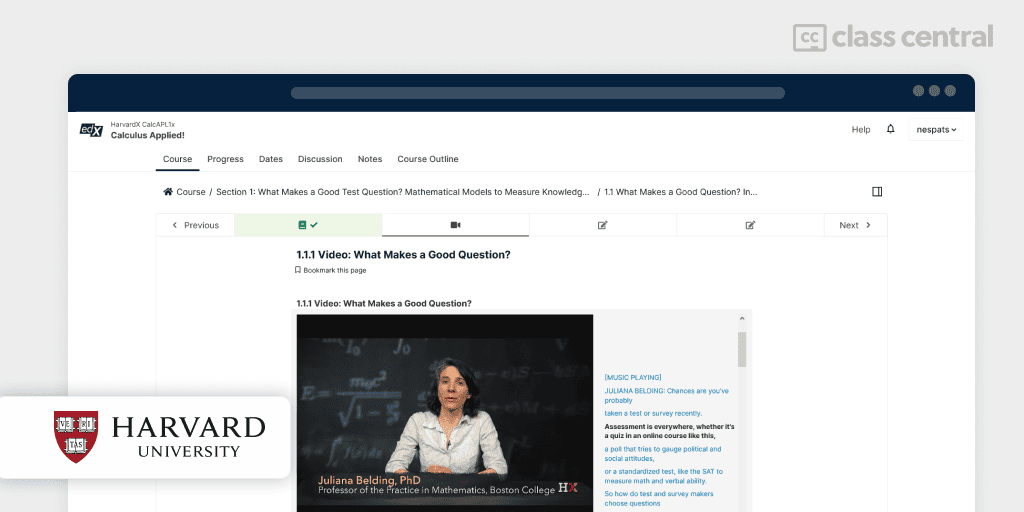
Calculus Applied! is a dynamic course designed for individuals who have completed or are currently enrolled in a single-variable calculus course. Ideal for students and teachers alike, this course ventures beyond traditional textbooks to explore the practical application of calculus in various fields. Through engaging case studies, you will discover how calculus and mathematical models are utilized by professionals to solve real-world problems, from analyzing test question difficulty to predicting population changes and understanding medical imaging techniques.
You’ll gain:
- Insight into how calculus is applied in social, life, and physical sciences through real-world case studies
- Understanding of mathematical models and their role in professional practices, including economics, biology, and physics
- Practical skills in analyzing data, writing equations, performing calculus computations, and making educated guesses and predictions
- Enhanced knowledge of derivatives, integrals, and differential equations and their applications outside of the classroom.
| Provider | edX |
| Institution | Harvard University |
| Instructor | John Wesley Cain and Juliana Belding |
| Time Commitment | 30-60 hours |
| Enrollment | 169K |
| Rating | 4.8/5.0 (34) |
| Cost | Free audit |
| Certificate | Paid |
Best AP Calculus Exam Prep Course (Study.com)
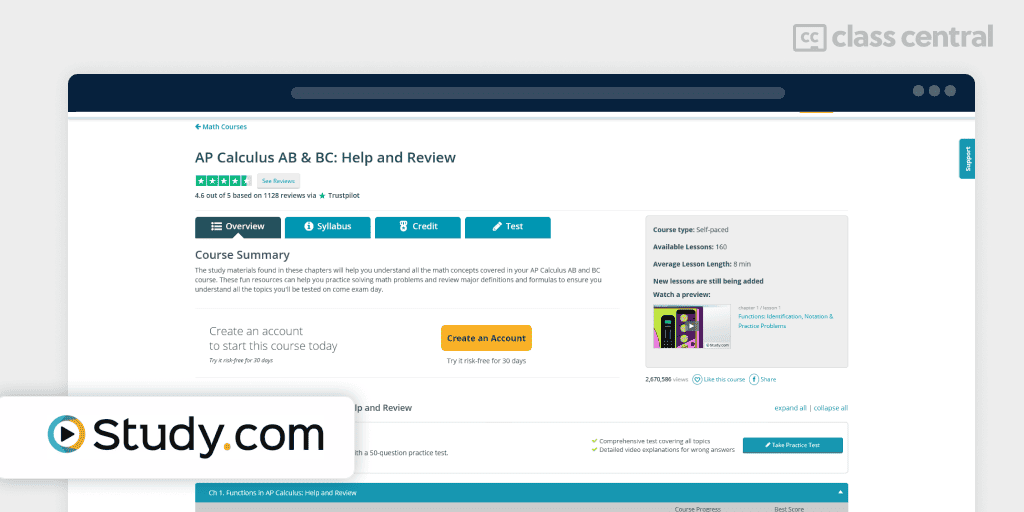
AP Calculus AB & BC: Help and Review is a comprehensive resource designed to help students excel in their AP Calculus AB and BC exams. Covering all essential math concepts, it’s ideal if you’re seeking a thorough review and grasp all the topics in the AP Calculus curriculum before exam day. The syllabus is structured to ensure a deep understanding of each topic with a focus on solving math problems and reviewing major definitions and formulas.
What you will gain from this course:
- Mastery of AP Calculus AB & BC concepts, including functions, graphing, sequences, and series
- Deep understanding of limits, continuity, exponentials, logarithms, derivatives, and integrals
- Skills to solve complex calculus problems and apply calculus in various scenarios
- Confidence to tackle the AP Calculus AB & BC exams with comprehensive review materials.
More Study.com AP Calculus courses:
- AP Calculus AB & BC: Tutoring Solution 19 hours
- AP Calculus BC: Exam Prep 22 hours
| Provider | Study.com |
| Time Commitment | 21 hours |
| Views | 2M |
| Cost | Paid |
| Certificate | Not available |
More Useful Free Resources
While the courses in this guide focus on calculus, perhaps you’ve discovered that you need to learn or refresh your knowledge of a specific mathematical aspect before you can fully understand the material.
Here are some useful resources and YouTube channels:
- Tutorials for Complex Systems from the Santa Fe Institute via Complexity Explorer is a free collection of mainly mathematical courses including Differential Calculus, Random Walks, Vector and Matrix Algebra, Game Theory, and more
- Khan Academy has mathematics videos and courses from Pre-K all the way up to calculus. If you (or your child) is stuck on any aspect of mathematics, Khan Academy is sure to have an explanation for you
- Calculus community on Reddit: https://www.reddit.com/r/calculus/
- Dr Peyam YouTube channel
- 3Blue1Brown YouTube channel, especially his Essence of calculus series.
Why You Should Trust Us
Class Central, a Tripadvisor for online education, has helped 100 million learners find their next course. We’ve been combing through online education for more than a decade to aggregate a catalog of 250,000 online courses and 250,000+ reviews written by our users. And we’re online learners ourselves: combined, the Class Central team has completed over 400 online courses, including online degrees. I’ve personally completed over 200 online courses in a variety of topics.
How We Made Our Picks and Tested Them
Trying to find “the best” can be daunting, even for those of us who live and breathe online courses. Here’s how I approached this task.
First, I combed through Class Central’s Catalog and the internet to find a variety of free and paid open courses, some with certificates. You don’t need to enroll in a university to learn about calculus.
When choosing courses, I considered the following factors:
- Renowned Institutions: I looked for recognized institutions in calculus
- Instructor experience: I sought instructors with extensive experience in calculus and engaging presentation styles
- Popularity: I checked numbers of enrollments and views to find popular courses
- Course content: I examined courses that covered a range of topics and presentation styles, including the basics and more advanced topics. I watched some course videos to sample courses I hadn’t already taken
- Learner reviews: I read learner reviews (when available) to get a sense of the quality of each course, leveraging the Class Central database with its thousands of course ratings and reviews written by our users as well as available course provider reviews.
Then, I defined the scope for these recommendations. Calculus has several facets, so I chose top courses from a range of sub-fields and applications.
Ultimately, I used a combination of data and my own judgment to make these picks. I’m confident these recommendations will be a reliable way to learn about calculus.








